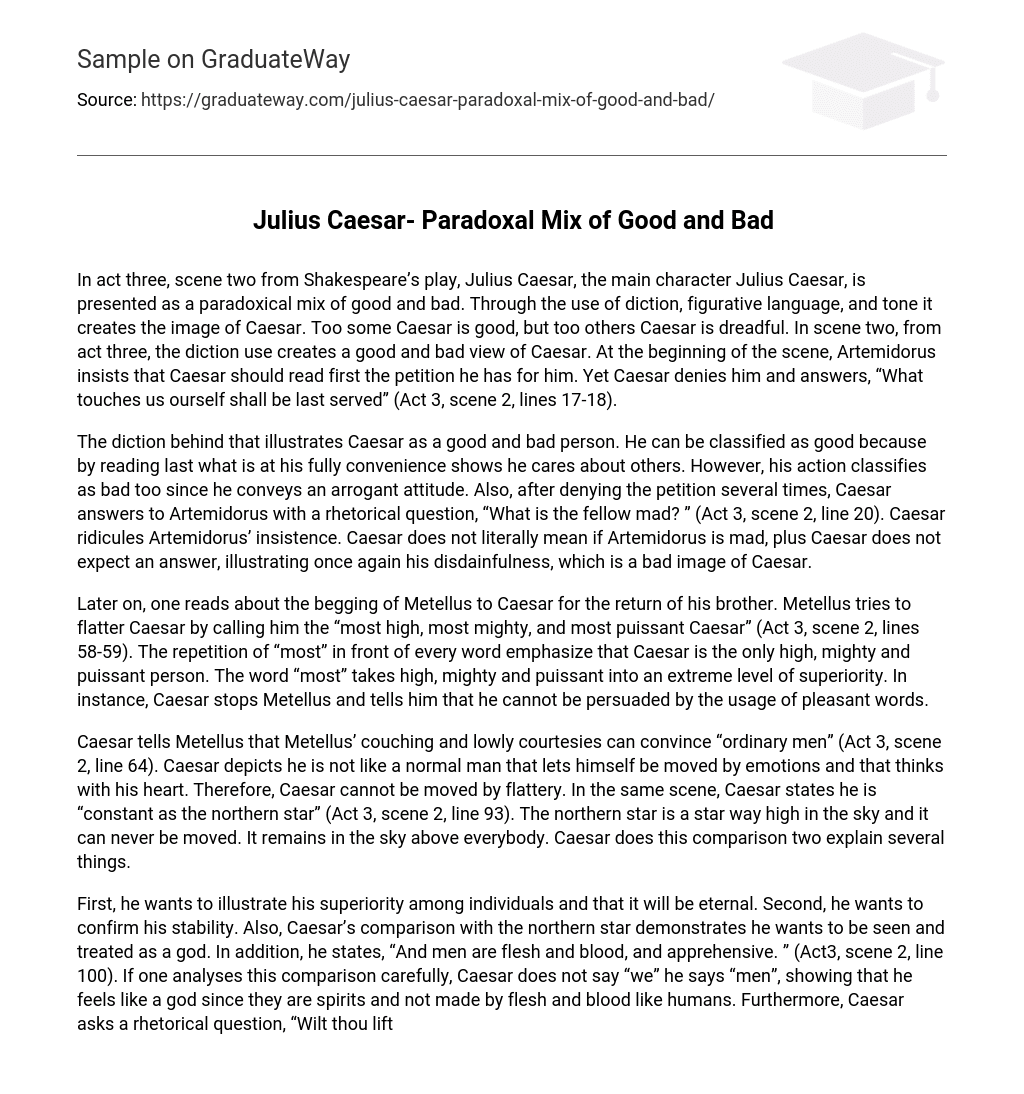In act three, scene two from Shakespeare’s play, Julius Caesar, the main character Julius Caesar, is presented as a paradoxical mix of good and bad. Through the use of diction, figurative language, and tone it creates the image of Caesar. Too some Caesar is good, but too others Caesar is dreadful. In scene two, from act three, the diction use creates a good and bad view of Caesar. At the beginning of the scene, Artemidorus insists that Caesar should read first the petition he has for him. Yet Caesar denies him and answers, “What touches us ourself shall be last served” (Act 3, scene 2, lines 17-18).
The diction behind that illustrates Caesar as a good and bad person. He can be classified as good because by reading last what is at his fully convenience shows he cares about others. However, his action classifies as bad too since he conveys an arrogant attitude. Also, after denying the petition several times, Caesar answers to Artemidorus with a rhetorical question, “What is the fellow mad? ” (Act 3, scene 2, line 20). Caesar ridicules Artemidorus’ insistence. Caesar does not literally mean if Artemidorus is mad, plus Caesar does not expect an answer, illustrating once again his disdainfulness, which is a bad image of Caesar.
Later on, one reads about the begging of Metellus to Caesar for the return of his brother. Metellus tries to flatter Caesar by calling him the “most high, most mighty, and most puissant Caesar” (Act 3, scene 2, lines 58-59). The repetition of “most” in front of every word emphasize that Caesar is the only high, mighty and puissant person. The word “most” takes high, mighty and puissant into an extreme level of superiority. In instance, Caesar stops Metellus and tells him that he cannot be persuaded by the usage of pleasant words.
Caesar tells Metellus that Metellus’ couching and lowly courtesies can convince “ordinary men” (Act 3, scene 2, line 64). Caesar depicts he is not like a normal man that lets himself be moved by emotions and that thinks with his heart. Therefore, Caesar cannot be moved by flattery. In the same scene, Caesar states he is “constant as the northern star” (Act 3, scene 2, line 93). The northern star is a star way high in the sky and it can never be moved. It remains in the sky above everybody. Caesar does this comparison two explain several things.
First, he wants to illustrate his superiority among individuals and that it will be eternal. Second, he wants to confirm his stability. Also, Caesar’s comparison with the northern star demonstrates he wants to be seen and treated as a god. In addition, he states, “And men are flesh and blood, and apprehensive. ” (Act3, scene 2, line 100). If one analyses this comparison carefully, Caesar does not say “we” he says “men”, showing that he feels like a god since they are spirits and not made by flesh and blood like humans. Furthermore, Caesar asks a rhetorical question, “Wilt thou lift up Olympus? (Act 3, scene 2, line 108). Caesar associates him self to mount Olympus in order for the reader to acknowledge that his constancy is like a mountain. A mountain cannot be moved under any circumstances. Therefore Caesar cannot be moved under any circumstances. In addition, mount Olympus is the mountain of the gods, thus Caesar once again shows his desire of being a god figure. Caesar’s attitude conveys him as an evil person. The figurative language used in this scene is mostly metaphors and it creates both a fine and dreadful picture of Caesar.
The diction and the figurative language support the tone of the scene, and all three devices support the paradoxical mix of Caesar’s image of good and bad. At the beginning of the scene, Artemidorus approaches Caesar with a hail, “Hail Caesar! ” (Act 3, scene 2, line 10). The hail creates a praising tone, which only respected individuals receive praises. This assists Caesar by giving him a positive image. Moreover, Caesar’s usage of the third person creates a doubtful tone. Caesar usage of the third person shows insecurity. In some cases, his third person usage also creates a demanding tone.
For example, when Metellus is about to enter and kneel upon Caesar, Caesar informs he is ready to fix the problem. “What is now amiss that Caesar and his senate must redress? ” (Act 3, scene 2, line 57). Caesar’s tone is demanding since he informs he is ready now to solve the problems. Also, Caesar shows possession since he says Caesar and his senate. As a political leader, it is good Caesar does not fall for flattery and does not let him self be persuaded by insignificant words, but arrogance and his feel of superiority can be dreadful. Through out the scene, Caesar is presented as a paradoxical mix of good and bad.





